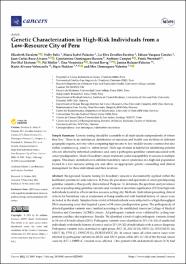Mostrar el registro sencillo del ítem
Genetic Characterization in High-Risk Individuals from a Low-Resource City of Peru
| dc.contributor.author | Zavaleta, Elizabeth | es_ES |
| dc.contributor.author | Solis, Nelly | es_ES |
| dc.contributor.author | Palacios, Maria Isabel | es_ES |
| dc.contributor.author | Zevallos-Escobar, Liz Elva | es_ES |
| dc.contributor.author | Vasquez Corales, Edison | es_ES |
| dc.contributor.author | Bazo-Alvarez, Juan Carlos | es_ES |
| dc.contributor.author | Dominguez-Barrera, Constantino | es_ES |
| dc.contributor.author | Campos, Anthony | es_ES |
| dc.contributor.author | Wernhoff, Patrik | es_ES |
| dc.contributor.author | Ekstrøm, Per Olaf | es_ES |
| dc.contributor.author | Møller, Pål | es_ES |
| dc.contributor.author | Visnovska, Tina | es_ES |
| dc.contributor.author | Hovig, Eivind | es_ES |
| dc.contributor.author | Balazar-Palacios, Janina | es_ES |
| dc.contributor.author | Alvarez-Valenzuela, Karin | es_ES |
| dc.contributor.author | Nakken, Sigve | es_ES |
| dc.contributor.author | Dominguez-Valentin, Mev | es_ES |
| dc.date.accessioned | 2023-02-21T16:06:31Z | |
| dc.date.available | 2023-02-21T16:06:31Z | |
| dc.date.issued | 2022-11-15 | |
| dc.identifier.uri | https://hdl.handle.net/20.500.13053/7833 | |
| dc.description.abstract | Background: Genetic testing for hereditary cancers is inconsistently applied within the healthcare systems in Latin America. In Peru, the prevalence and spectrum of cancer-predisposing germline variants is thus poorly characterized. Purpose: To determine the spectrum and prevalence of cancer-predisposing germline variants and variants of uncertain significance (VUS) in high-risk individuals located in a Peruvian low-resource setting city. Methods: Individuals presenting clinical criteria for hereditary cancer syndromes or being unaffected with familial history of cancer were included in the study. Samples from a total of 84 individuals were subjected to a high-throughput DNA sequencing assay that targeted a panel of 94 cancer predisposition genes. The pathogenicity of detected germline variants was classified according to the established American College of Medical Genetics and Genomics (ACMG) criteria. All pathogenic variants were validated by cycling temperature capillary electrophoresis. Results: We identified a total of eight pathogenic variants, found in 19 out of 84 individuals (23%). Pathogenic variants were identified in 24% (10/42) of unaffected individuals with family history of cancer and in 21% (9/42) of individuals with a cancer diagnosis. Pathogenic variants were identified in eight genes: RET (3), BRCA1 (3), SBDS (2), SBDS/MLH1 (4), MLH1 (4), TP53 (1), FANCD2 (1), DDB2/FANCG (1). In cancer cases, all colon cancer cases were affected by pathogenic variants in MLH1 and SBDS genes, while 20% (2/10) of the thyroid cancer cases by RET c.1900T>C variants were affected. One patient with endometrial cancer (1/3) had a double heterozygous pathogenic variant in DDB2 and FANCG genes, while one breast cancer patient (1/14) had a pathogenic variant in TP53 gene. Overall, each individual presented at least 17 VUS, totaling 1926 VUS for the full study population. Conclusion: We describe the first genetic characterization in a low-resource setting population where genetic testing is not yet implemented. We identified multiple pathogenic germline variants in clinically actionable predisposition genes, that have an impact on providing an appropriate genetic counselling and clinical management for individuals and their relatives who carry these variants. We also reported a high number of VUS, which may indicate variants specific for this population and may require a determination of their clinical significance. | es_ES |
| dc.format | application/pdf | es_ES |
| dc.language.iso | eng | es_ES |
| dc.publisher | MDPI | es_ES |
| dc.rights | info:eu-repo/semantics/openAccess | es_ES |
| dc.rights.uri | https://creativecommons.org/licenses/by/4.0/ | es_ES |
| dc.subject | Peru; hereditary cancer; gene panel; family history | es_ES |
| dc.title | Genetic Characterization in High-Risk Individuals from a Low-Resource City of Peru | es_ES |
| dc.type | info:eu-repo/semantics/article | es_ES |
| dc.identifier.doi | https://doi.org/10.3390/cancers14225603 | es_ES |
| dc.type.version | info:eu-repo/semantics/publishedVersion | es_ES |
| dc.publisher.country | CH | es_ES |
| dc.subject.ocde | http://purl.org/pe-repo/ocde/ford#3.03.00 | es_ES |
Ficheros en el ítem
Este ítem aparece en la(s) siguiente(s) colección(es)
-
Web of Science (WOS) [236]


